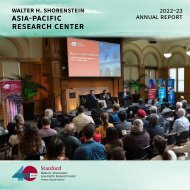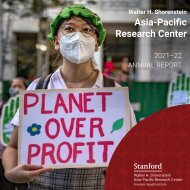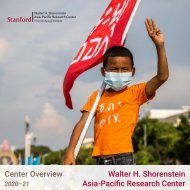Shorenstein Asia-Pacific Research Center 2018-19 Annual Report
The Walter H. Shorenstein Asia-Pacific Research Center (Shorenstein APARC) addresses critical issues affecting the countries of Asia, their regional and global affairs, and U.S.-Asia relations. As Stanford University’s hub for the interdisciplinary study of contemporary Asia, we produce policy-relevant research, provide education and training to students, scholars, and practitioners, and strengthen dialogue and cooperation between counterparts in the Asia-Pacific and the United States. This is our annual overview for the academic year 2018-19.
The Walter H. Shorenstein Asia-Pacific Research Center (Shorenstein APARC) addresses critical issues affecting the countries of Asia, their regional and global affairs, and U.S.-Asia relations. As Stanford University’s hub for the interdisciplinary study of contemporary Asia, we produce policy-relevant research, provide education and training to students, scholars, and practitioners, and strengthen dialogue and cooperation between counterparts in the Asia-Pacific and the United States. This is our annual overview for the academic year 2018-19.
You also want an ePaper? Increase the reach of your titles
YUMPU automatically turns print PDFs into web optimized ePapers that Google loves.
DIRECTOR’S MESSAGE
The year 2019 featured
important anniversaries for the
Asia-Pacific region and U.S.-Asia relations.
These anniversaries, however,
symbolize anything but stability.
We saw a grandiose celebration of 70 years of
communist rule in China; witnessed Shinzo Abe
becoming Japan’s longest-serving postwar
prime minister; commemorated the centennial of the
anti-colonialist independence movement of South Korea;
marked the first anniversary of both the historic
Singapore summit between President Trump and North
Korean leader Kim Jong Un as well as the Panmunjom
summit between Kim and South Korean president Moon
Jae-in; and observed the 40th anniversary of both U.S.-
China diplomatic relations and of the Taiwan Relations Act.
Yet in every arena volatility is spreading.
The scenes of pageantry and unity in Tiananmen Square
were overshadowed by an escalation in the unrelenting
pro-democracy demonstrations in Hong Kong. The
United States and China are mired in a trade war and
a race for technological supremacy, and Beijing has
intensified its economic and diplomatic pressure on
Taipei. The collapse of the second Trump-Kim summit
exposed the ambiguities surrounding North Korean
denuclearization, inter-Korean rapprochement efforts
have been stranded by the stalemate on the nuclear track,
and, at the time of this writing, details have emerged
about the failure of the much-anticipated U.S.-DPRK
working-level nuclear talks. Rising nationalism in Japan
and South Korea is driving those two states toward
potential disaster, while autocrat-leaning populism is
expanding in Southeast Asia.
These developments bring to relief the U.S. withdrawal
from multilateralism and the lack of American
leadership in the Asia-Pacific. For even as Washington
embraces a vision of a “free and open Indo-Pacific,” its
Asia policy remains focused on “fair” bilateral deals and
“America First” thinking. What else, then, could we expect
but increasingly fragile regional dynamics, explosions
of nationalist chauvinism, and a global retreat from
democratic values and human rights protections? Most
disconcerting is that this leadership void in Asia comes
at a time when Washington needs to marshal alliances
to address, in unison, China’s growing regional and
global influence.
Today, more than ever, we must invest in building a
solid foundation of education, knowledge, and dialogue
about the critical challenges facing the Asia-Pacific
and U.S.-Asia relations. Shorenstein APARC research
and teaching and the intellectual exchange we facilitate
exemplify how we work to generate new ideas that
inform policy responses to these challenges. We have
been leading this charge for over 35 years and are
committed to carrying it on.
While the U.S.-China conflict and the prospects for the
diplomacy of the denuclearization of the Korean Peninsula
took center stage on Shorenstein APARC’s agenda
reviewed here and will surely continue to occupy us, we
are starting the 2019–20 academic year with a thematic
emphasis on the threats to democracy and human rights
in Asia. We look forward to seeing you at some of our
forums exploring this and other pressing issues. Thank
you for being part of our community.
Gi-Wook Shin, Director
2 SHORENSTEIN APARC






